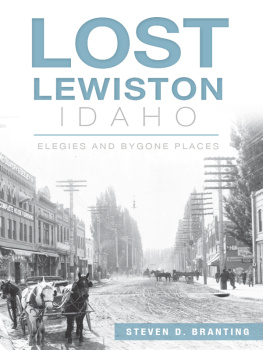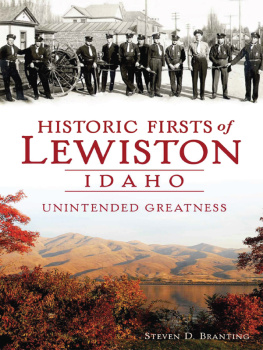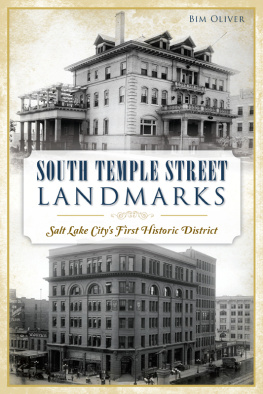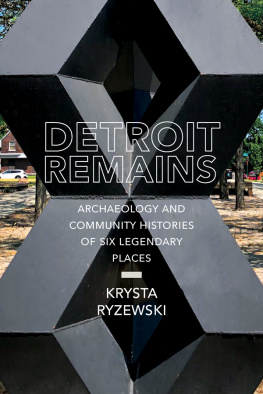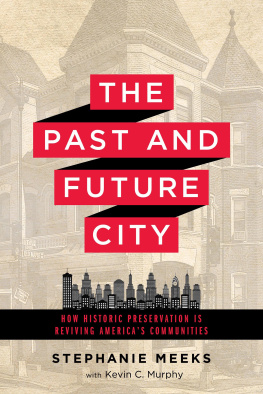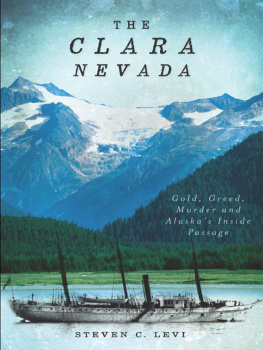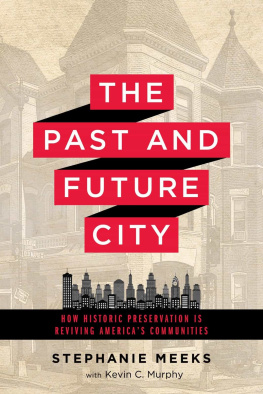
Published by The History Press
Charleston, SC 29403
www.historypress.net
Copyright 2014 by Steven D. Branting
All rights reserved
First published 2014
e-book edition 2014
ISBN 9781.62585.154.3
Library of Congress Control Number: 2014952271
print edition ISBN 9781.62619.617.9
Notice: The information in this book is true and complete to the best of our knowledge. It is offered without guarantee on the part of the author or The History Press. The author and The History Press disclaim all liability in connection with the use of this book.
Unless otherwise indicated, all images in this book are in the public domain or are courtesy of the archives of the Nez Perce County Historical Society, located at 0306 Third Street, Lewiston, Idaho 83501. All rights reserved. No part of this book may be reproduced or transmitted in any form whatsoever without prior written permission from the publisher except in the case of brief quotations embodied in critical articles and reviews.
For faithful Shann, my partner at the oars on the river of time.
For my universally esteemed father, John Herbert Branting (19191980).
His life was gentle, and the elements
So mixed in him that Nature might stand up
And say to all the world, This was a man.
William Shakespeare, Julius Caesar
CONTENTS
PREFACE
The archival contributions of DeLayne Whipple Brown (Vancouver, Washington) were invaluable assets to my research into the life of John Douglas McConkey.
I am indebted to Matthias Bertram (Bad Neuenahr-Ahrweiler, Germany) for kindly supplying letters posted from Lewiston by Peter Josef Ley, his second great-granduncle and an early Lewiston business owner, and to Dr. Stefanie Seewald (Leuphana University of Lneburg, Germany) for her lucid translation of those letters.
My thanks go out to Rabbi Victor S. Appell, Union for Reform Judaism (New York, New York), for his input regarding canon law and its application to pivotal events in the lives of Jewish families.
As with the first two books in this trilogy, Mary E. White-Romero (museum curator, Nez Perce County Historical Society) made my access to the museum archives a seamless and productive task.
Portions of this book have appeared in different forms in A Confluence of Doyennes, Idaho Yesterdays, Journey, the Golden Age, the History Teacher, Journal of the Association for History and Computing and the Western Historical Quarterly.
To link the reader to additional content, parenthetical references are provided throughout this book to stories and photographs that appeared in earlier volumes of the Lewiston trilogy, such as Historic Firsts 3436 and Hidden History 8086.
Expenditures and costs for various projects have been listed in terms of their original outlays and what reasonably equivalent values would be today, as in this example for 1894: $2,500 ($66,000).
Introduction
OUR PAST IN THE PRESENT TENSE
An unknown love-struck poet poured out his heart for his sister (beloved) in New Kingdom Egypt (1550 BCE1080 BCE).
My sister is better than all prescriptions.
She does more for me than all medicines.
Her coming and going to me is my amulet.
The sight of her makes me well!
When she opens her eyes, my body is young.
Her speaking makes me strong.
Embracing her expels my malady.
William Shakespeare, Walt Whitman or Dobie Gillis could not have penned it better, and in that very fact lies the premise to this book: human nature unites all human existence, past and present. We are separated from that forlorn lover only by time, circumstance and, sadly, technology, which has always inflated a societys sense of uniqueness and created that cultural noise that promotes feelings of superiority of one generation over another. Noise proves nothing, Mark Twain observed. Often a hen who has merely laid an egg cackles as if she laid an asteroid.
In 2014, the Bowers Museum in Santa Ana, California, opened the exhibit Soulful Creatures: Animal Mummies of Ancient Egypt. Those ancient people loved their animals, which were intimately associated with a pantheon of zoomorphic gods. One mummy was dedicated to ibis-headed Thoth and contained a letter from a man who was having a difficult time at work, certain that a co-worker was badmouthing him behind his back to his boss. The complainant wanted the god to intervene. Nothing seems to have changed.
One advantage to exploring the past is that it prevents us from feeling too self-important. Stephen Crane, the author of The Red Badge of Courage, experimented with brief verses, which he called bitter little pills and are considered today to be the precursors of modern poetry. In one example, Crane wrote:
A man said to the universe:
Sir, I exist!
However, replied the universe,
The fact has not created in me
A sense of obligation.
Although I know my parents loved me, I have a suspicion that many of my childhood memories are false, filtered through their imperfect memories. Mother would relate how I was prone, as a toddler, to wander away from our home in a small Idaho town in the late 1940s. Being a busy parent with a babe-in-arms required ingenuity to corral this restless child. She took a good length of rope and tied me to a tree in the back yard. Of course, any good measure deserves a good counter-measure. As she was wont to tell, things became quiet behind the house one day. Investigating, she found me gone, having chewed the rope in two. By the time my father arrived home from work, she was a bit frantic. He calmed her and set out to find me, which didnt take long. It was a small town, you know. In the finding came a rude discovery.

John Branting, circa 1945. Courtesy of the Branting Archives.
His nomadic son was stark naked, dancing to the music of the jukebox in a local bar, with coins on the floor around me, scattered there by patrons who were delighted with my fox trot. I can remember my mother using the word mortified to describe my fathers reaction, and my father was not one to readily show his emotions.
If any story will keep my ego anchored, this bit of life experience has most assuredly done so. The problem is: was the story so embellished, so garbled in the retelling, that by the time I heard it the account was more fable than fact, more faulty reconstruction than reality. Eyewitness testimony is notoriously inaccurate, even when people see the same event from the same vantage point. Anonymous once opined, History books that contain not falsehoods are extremely dull. Lives are much the same. Much of history is gossip made respectable by the passage of time. Parents have always been searching for wandering children.
The reality of the present is little different from the reality of the past, and all of us live in the past. I am not speaking about nostalgia or people who are stuck in the 60s, 70s or 80s. Anyone who longs for the good old days has never spent a Lewiston August without air conditioning, but thats not my point. Neuroscientists have actually calculated that our consciousness lags eighty milliseconds behind actual events. What we sometimes call real time isnt so real after all. Its almost as though now does not exist.
Try a little experiment. Touch the top of your head and your knee at the same time. You might think the actions take place simultaneously, but it actually takes longer for the signal from the knee to reach your brain than it takes the signal from your head. The brain compensates for the eighty-millisecond time gap in the information assembly line that continually runs in your head.
Next page
